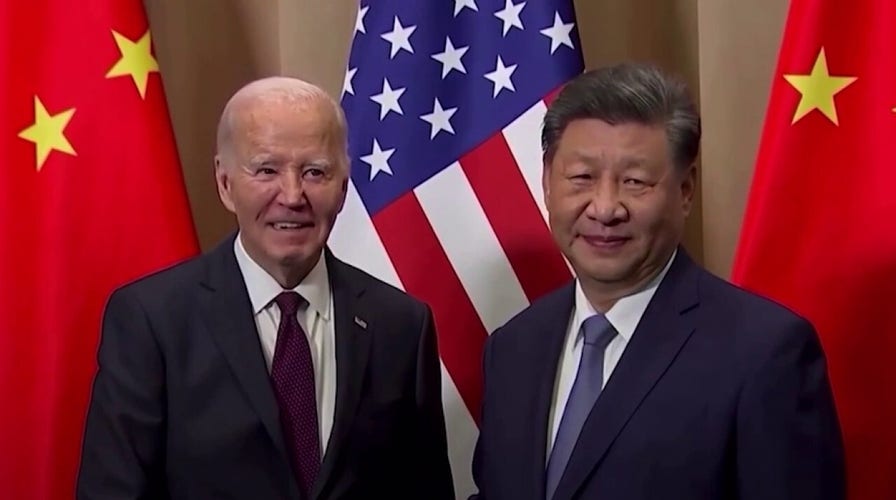A federal China commission released its sprawling yearly report to Congress on Tuesday, for the first time recommending lawmakers end China’s favored trade status and the provision that allows goods under $800 to enter the U.S. duty-free.
The U.S.-China Economic and Security Review Commission, established by Congress as a bipartisan entity to investigate and provide policy recommendations on China, is now directly advocating for Congress to end the Permanent Normal Trade Relations (PNTR) China has enjoyed since 2004.
The committee will pitch its 83 policy recommendations to lawmakers on Tuesday, along with a report on China’s military capabilities, its threats to U.S. allies in the region and how it is exploiting U.S. policy for its own advancement.
‘For decades we have engaged in whack-a-mole policy working within international organizations and guidelines to address the increasing and ambitious efforts by China to skirt laws or take advantage of trade loopholes,’ commission chair Robin Cleveland said.
‘In our hearing on the threats to American consumers this year we heard from administration and expert witnesses who were starkly clear: U.S. agencies do not know if the majority of packages coming from China include a baby toy painted with a toxic chemical—a counterfeit piece of clothing made with slave labor—or a pin head amount of fentanyl which is enough to kill the average citizen.’
‘While the administration has existing authority to shut down this flood of troubling products, we have a strong recommendation on legislative action that should strengthen safety and legal protections for consumers and manufacturers.’
The commission also identified an urgent need for AI advancement in the U.S., calling on Congress to establish and fund a ‘Manhattan Project-like program’ to acquire Artificial General Intelligence (AG) capability, defined as systems that would ‘surpass the sharpest human minds at every task.’
The prospect of eliminating PNTR, which allowed low-cost Chinese goods to flood U.S. markets throughout the 2000s by giving the CCP the same trade benefits as U.S. allies, faces increasingly likely odds with Republican control of the House and Senate.
Eliminating it would grant the president authority to assess and review whether greater tariffs are needed. President-elect Trump has vowed to drastically increase tariffs on Chinese-made goods.
The report found that Chinese goods increasingly evade regulatory inspection and tariffs by coming in shipments valued under $800, taking advantage of the ‘de minimus’ exemption in tariff law.
Eliminating ‘de minimus’ on e-commerce shipments would require Customs and Border Patrol to institute far greater oversight over small-dollar shipments, prompting a request for more resources in Congress. But the report found these shipments are often used to sneak fentanyl into the U.S.
The U.S. has brought in around $4 million in Chinese goods shipped under ‘de minimus’ per day this year, up from $3 million last year.
Congress should also consider legislation to eliminate federal tax expenditures for investments in Chinese companies that are on the Commerce Department’s trade blacklist known as the Entity List, per the report.
Such legislation could eliminate the preferential capital gains tax rate, the carried interest loophole or capital loss carry-forward provisions for companies that are believed to run afoul of U.S. interests or suspected to be stealing intellectual property.
The report also recommended the U.S. bolster its export controls to deny China access to critical dual-use goods and technologies and ban imports of certain technologies controlled by Chinese entities, like autonomous humanoid robots and energy infrastructure products.
It urged Congress to direct the administration to create an outbound investment office to oversee dollars flowing to investments in countries of concern and to amend laws to allow the Consumer Product Safety Commission mandatory recall authority over Chinese products.
Throughout the year, China has increasingly tried to crack down on dissent and ‘sanctions proof’ its economy, in preparation for a future of potential military or economic warfare with the West, the report noted. It conducted violent attacks on Philippine personnel operating within their own exclusive zone, tried to influence Taiwan’s democratic elections and incurred into Taiwanese air space over 2,300 times.
It launched its first intercontinental ballistic missile test into the South Pacific in more than 40 years.
Trump has begun to fill out his Cabinet with China hawks. On the campaign trail this year, Trump has proposed a 10% tariff on all U.S. imports and 60% on Chinese-made products.
If Trump successfully raises tariffs to 60%, it could reduce China’s exports by $200 billion and cause a one percentage point drag on GDP, said Zhu Baoliang, a former chief economist at China’s economic planning agency, at a Citigroup conference.
Last year, China exported about $500 billion worth of goods to the U.S., about 15% of all of its exports.
